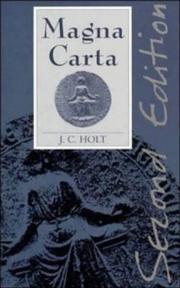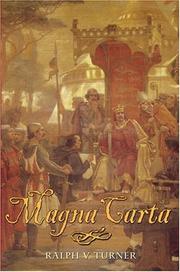| Listing 1 - 10 of 24 | << page >> |
Sort by
|
Book
ISBN: 131623732X 1316144593 1107093163 1107471575 Year: 2015 Publisher: Cambridge : Cambridge University Press,
Abstract | Keywords | Export | Availability | Bookmark
 Loading...
Loading...Choose an application
- Reference Manager
- EndNote
- RefWorks (Direct export to RefWorks)
A revised edition of J. C. Holt's classic study of Magna Carta, the Great Charter, offering the most authoritative analysis of England's most famous constitutional text. The book sets the events of 1215 and the Charter itself in the context of the law, politics and administration of England and Europe in the twelfth and thirteenth centuries. Additionally, a lengthy new introduction by two of Holt's former pupils, George Garnett and John Hudson, examines a range of issues raised by scholarship since publication of the second edition in 1992. These include the possible role of Archbishop Stephen Langton; the degree of influence of Roman and Canon Law upon those who drafted the Charter; other aspects of the intellectual setting of the Charter, in particular political thinking in London; the Continental context of the events of 1212-15; and the legal and jurisdictional issues that affected the Charter's clauses on justice.

ISBN: 0521259703 0521277787 1316223728 1316223329 1107049954 9780521259705 9780521277785 9781107049956 Year: 1991 Publisher: Cambridge Cambridge University Press
Abstract | Keywords | Export | Availability | Bookmark
 Loading...
Loading...Choose an application
- Reference Manager
- EndNote
- RefWorks (Direct export to RefWorks)
This is a fully revised and extended edition of J. C. Holt's study of Magna Carta, the Great Charter, which sets the events of 1215 and the Charter itself in the context of the law, politics and administration of England and Europe in the twelfth and thirteenth centuries. The author has added to the first edition (1965) further comment on the development of local liberties, the significance of the famous provision nullus liber homo, the political manoeuvres of 1215, and the later history of the Charter, and many other matters. The book is broadened by the addition of an extensive chapter on justice and jurisdiction which embodies an entirely new approach to some of the most crucial and longest-lasting provisions of the Charter. New appendices have been added. Some of these are concerned with the political crisis of 1213-15, for example the alleged meeting at Bury St Edmunds; others examine the Anglo-Norman translations of the Charter and related documents, or the development of perpetual liberties. References are brought up to date throughout, and there is an entirely new index.
Law --- Droit --- History --- Histoire --- Magna Carta --- Magna Carta. --- Magna Charta --- Magna carta regis Johannis, XV die junii, MCCXV, anno regni XVII --- Velikai︠a︡ Khartīi︠a︡ Volʹnosteĭ --- Magŭna Kʻarŭtʻa

ISBN: 0582438268 Year: 2003 Publisher: Harlow Longman
Abstract | Keywords | Export | Availability | Bookmark
 Loading...
Loading...Choose an application
- Reference Manager
- EndNote
- RefWorks (Direct export to RefWorks)
Constitutional history --- Sources. --- Sources --- Constitutional history, Modern --- Constitutional law --- Constitutions --- History --- Magna Carta. --- Magna Charta --- Magna carta regis Johannis, XV die junii, MCCXV, anno regni XVII --- Velikai︠a︡ Khartīi︠a︡ Volʹnosteĭ --- Magŭna Kʻarŭtʻa
Book
ISBN: 1909646881 1909646873 9781909646872 9781909646889 Year: 2018 Publisher: London
Abstract | Keywords | Export | Availability | Bookmark
 Loading...
Loading...Choose an application
- Reference Manager
- EndNote
- RefWorks (Direct export to RefWorks)
This book examines the history and influence of Magna Carta in British and American history. In a series of essays written by notable British specialists, it considers the origins of the document in the political and religious contexts of the thirteenth century, the relevance of its principles to the seventeenth century disputes that led to the Civil War, the uses made of Magna Carta to justify the American Revolution, and its inspiration of the radical-democratic movement in Britain in the early nineteenth century. The introductory essay considers the celebration of Magna Carta's 800th anniversary in 2015 in relation to ceremonials and remembrance in Britain in general. Given as papers to a joint conference of British and Chinese historians in Beijing in 2015, these essays provide a clear and insightful overview of the origins and impact of a medieval document that has shaped the history of the world.
Constitutional history --- England --- Magna Carta. --- Magna Charta --- Magna carta regis Johannis, XV die junii, MCCXV, anno regni XVII --- Velikai︠a︡ Khartīi︠a︡ Volʹnosteĭ --- Magŭna Kʻarŭtʻa --- Magna Carta --- History
Book
ISBN: 1283126737 9786613126733 900418757X 9789004187573 9789004187566 9004187561 Year: 2010 Publisher: Leiden, the Netherlands Boston Brill
Abstract | Keywords | Export | Availability | Bookmark
 Loading...
Loading...Choose an application
- Reference Manager
- EndNote
- RefWorks (Direct export to RefWorks)
Felix Liebermann’s Die Gesetze der Angelsachsen (1903-1916) remains the single most important contribution to the study of early English law. This volume marks the Gesetze’s centenary by bringing together original essays by an international group of leading scholars specializing in medieval legal culture. The essays address not only Liebermann’s life and legacy, but also major issues in the study of early law, including the relationship between Old English legal and penitential texts, the provenance of early English legal manuscripts, the composition and dating of pre-Magna Carta legislation, and the nature of Anglo-Saxon and Norman legal practice and procedure. This collection provides an essential assessment of the current state of early legal studies as well as a roadmap for future work. Contributors are Hideyuki Arimitsu, Rebecca Brackmann, Daniela Fruscione, R.D. Fulk, Thomas Gobbitt, Janelle Greenberg, John Hudson, Stefan Jurasinski, Nicholas Karn, T.B. Lambert, Andrew Rabin, Mary P. Richards, Richard Sharpe, and Jürg Rainer Schwyter.
Law, Anglo-Saxon. --- Law --- Anglo-Saxon law --- History. --- Liebermann, F. --- Liebermann, Felix, --- Magna Carta. --- Gesetze der Angelsachsen. --- Magna Charta --- Magna carta regis Johannis, XV die junii, MCCXV, anno regni XVII --- Velikai︠a︡ Khartīi︠a︡ Volʹnosteĭ --- Magŭna Kʻarŭtʻa
Book
ISBN: 9781843835486 9781846158124 Year: 2010 Publisher: Woodbridge Boydell and Brewer
Abstract | Keywords | Export | Availability | Bookmark
 Loading...
Loading...Choose an application
- Reference Manager
- EndNote
- RefWorks (Direct export to RefWorks)
Magna Carta. --- Magna Charta --- Magna carta regis Johannis, XV die junii, MCCXV, anno regni XVII --- Velikai︠a︡ Khartīi︠a︡ Volʹnosteĭ --- Magŭna Kʻarŭtʻa --- Great Britain --- Law --- History
Book
ISBN: 1316952401 1316953297 1316637573 1316940993 1316954188 1316955079 1316957748 1107187052 1316956857 1316947068 9781316957745 9781316940990 9781316637579 9781316955079 9781107187054 9781316954188 Year: 2017 Publisher: Cambridge, United Kingdom New York, NY, USA
Abstract | Keywords | Export | Availability | Bookmark
 Loading...
Loading...Choose an application
- Reference Manager
- EndNote
- RefWorks (Direct export to RefWorks)
Magna Carta was largely ineffective for practical purposes between the fourteenth century and the sixteenth, late-medieval law lectures giving no hint of its later importance. A treatise by William Fleetwood (c.1558) was still in the traditional mould, but the lectures of the 'Puritan' barrister and MP Robert Snagge in 1581, and the speeches and tracts of his colleagues, advocated new uses for it. After centuries of oblivion, in 1587 there were eight reported cases in which chapter 29 was cited. Sir Edward Coke made extensive claims for chapter 29, linking it with habeas corpus, and then as a judge (1606-16) he deployed it with effect in challenging encroachments on the common law and the liberty of the subject. This book ends in 1616 with the lectures of Francis Ashley, summarising the effects of the new learning, and then Coke's dismissal for pushing his case too hard. A challenging new account.
Constitutional history --- Constitutional history, Modern --- Constitutional law --- Constitutions --- History --- Magna Carta --- Magna Charta --- Magna carta regis Johannis, XV die junii, MCCXV, anno regni XVII --- Velikai︠a︡ Khartīi︠a︡ Volʹnosteĭ --- Magŭna Kʻarŭtʻa --- Influence. --- Histoire constitutionnelle
Book
ISBN: 3428055802 Year: 1984 Volume: vol 36 Publisher: Berlin Duncker & Humblot
Abstract | Keywords | Export | Availability | Bookmark
 Loading...
Loading...Choose an application
- Reference Manager
- EndNote
- RefWorks (Direct export to RefWorks)
Constitutional history --- -34 <09> --- Constitutional history, Modern --- Constitutional law --- Constitutions --- History --- Rechtsgeschiedenis --(algemeen) --- 34 <09> Rechtsgeschiedenis --(algemeen) --- 34 <09> --- Magna Carta. --- Magna Charta --- Magna carta regis Johannis, XV die junii, MCCXV, anno regni XVII --- Velikai︠a︡ Khartīi︠a︡ Volʹnosteĭ --- Magŭna Kʻarŭtʻa --- Grande Charte, 1215. --- Magna Charta, 1215.
Book
ISBN: 0714104736 Year: 1977 Publisher: London : British library - British museum,
Abstract | Keywords | Export | Availability | Bookmark
 Loading...
Loading...Choose an application
- Reference Manager
- EndNote
- RefWorks (Direct export to RefWorks)
Constitutional history --- -Constitutional history, Medieval --- Constitutional history, Modern --- Constitutional law --- Constitutions --- History --- Magna Carta --- Constitutional history, Medieval --- Magna Carta. --- Magna Charta --- Magna carta regis Johannis, XV die junii, MCCXV, anno regni XVII --- Velikai︠a︡ Khartīi︠a︡ Volʹnosteĭ --- Magŭna Kʻarŭtʻa
Book
ISBN: 1282401548 9786612401541 9047430247 9789047430247 9789004176805 9004176802 Year: 2009 Publisher: Leiden Boston
Abstract | Keywords | Export | Availability | Bookmark
 Loading...
Loading...Choose an application
- Reference Manager
- EndNote
- RefWorks (Direct export to RefWorks)
In historical research, Stephen Langton is primarily known as a Parisian master of theology. This biography is dedicated to Langton’s works as archbishop of Canterbury (1207-1228). His pontificate coincided with a period of political crisis in England, most notably the conflicts leading to the Magna Carta and its aftermath. This study sets out to show how Langton actively helped negotiate the Magna Carta: first, as an intercessor for the English barons and then by acting as a mediator between King John and the rebels. Furthermore, he was significantly involved in restoring the powers of kingship on the basis of the Magna Carta during the years of Henry III’s minority after the civil war. Langton's politics paint the picture of an archbishop whose policies were based on principles he had laid out in his theological writings before. Apart from Langton’s political role, this study also explores Langton’s pastoral and administrative commitments as bishop and baron. Stephen Langton ist der historischen Forschung in erster Linie als Pariser Magister der Theologie bekannt. Die Biographie widmet sich nun seinem Wirken als Erzbischof von Canterbury (1207-1228). Sein Pontifikat fiel in eine krisenhafte Periode der englischen Geschichte, die insbesondere vom Kampf um die Magna Carta geprägt war. Die Studie zeigt anschaulich, wie der Erzbischof Langton zunächst als Fürsprecher der englischen Barone, später als Vermittler zwischen König Johann Ohneland und den Rebellen maßgeblich zur Entstehung der Magna Carta beitrug und während der Minderjährigkeit Heinrichs III. half, die Königsherrschaft nach dem Bürgerkrieg in den Grenzen der Magna Carta wiederzuerrichten. Seine Politikgestaltung war dabei geprägt von politischen Grundsätzen, die er zuvor als Theologe formuliert hatte. Neben seinem politischen Engagement nimmt die detaillierte Untersuchung auch seine pastoralen und administrativen Verpflichtungen als Bischof und Baron in den Blick.
Bishops --- Archbishops --- Clergy --- Major orders --- Metropolitans --- Orders, Major --- Chaplains, Bishops' --- Episcopacy --- Langton, Stephen, --- Langthon, Stephen, --- Langton, Stefano, --- Langton, Stephan, --- Langton, Stephanus, --- Master Stephen of the Thundering Tongue, --- Stephanus de Lingua-Tonante, --- Magna Carta. --- Magna Charta --- Magna carta regis Johannis, XV die junii, MCCXV, anno regni XVII --- Velikai︠a︡ Khartīi︠a︡ Volʹnosteĭ --- Magŭna Kʻarŭtʻa --- Great Britain --- History --- Politics and government
| Listing 1 - 10 of 24 | << page >> |
Sort by
|

 Search
Search Feedback
Feedback About UniCat
About UniCat  Help
Help News
News